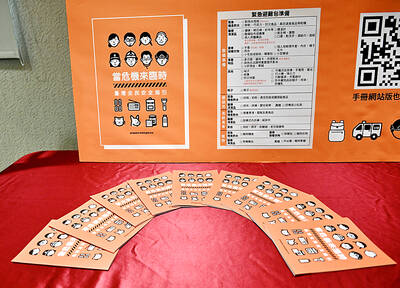The Ministry of Foreign Affairs yesterday raised its travel alert for Egypt from “orange” to “red,” the highest level in its warning system, the Tourism Bureau said.
The move came one day after the ministry issued an orange alert on travel to Egypt, advising travelers to avoid unnecessary trips to the country. The new advisory calls for travelers to cancel their trips.
The Tourism Bureau said the ministry raised the travel alert after demonstrations against the Egyptian government continued to escalate, adding that protesters were reported to have attacked the headquarters of the National Democratic Party as well as banks and supermarkets.
Amid rising tensions, the Egyptian government also implemented a curfew from 4pm Saturday until 8am yesterday. All communication services, including the Internet and mobile phones, were disconnected during the curfew, the bureau said.
AGREEMENT
The bureau said it had reached an agreement with the Travel Agent Association (TAA) and the Travel Quality Assurance Association so that travelers forced to cancel their trips because of the travel warning would be refunded based on Clause 28 of the Standardized Contract for Overseas Tour (國外旅遊定型化契約書範本), which stipulates that a contract between travel agents and travelers may be rescinded because of force majeure — a reason for which neither party can be held responsible.
The same clause states that travel agents may first deduct any expenditure that was made on behalf of the travelers or that was necessarily incurred in executing the contract.
To minimize losses, travelers could choose to either postpone their trips or switch to tours to other countries, the bureau said.
The TAA estimates that about 800 Taiwanese on high-end tour packages were scheduled to leave for the north African country during the Lunar New Year holiday, each paying between NT$70,000 and NT$110,000.
TAIWANESE IN EGYPT
The ministry said 22 Taiwanese businessmen were in Cairo and 410 Taiwanese tourists were currently in Egypt.
Ministry spokesman James Chang (章計平) said all were accounted for and safe.
ADDITIONAL REPORTING BY FLORA WANG

One of two tropical depressions that formed off Taiwan yesterday morning could turn into a moderate typhoon by the weekend, the Central Weather Administration (CWA) said yesterday. Tropical Depression No. 21 formed at 8am about 1,850km off the southeast coast, CWA forecaster Lee Meng-hsuan (李孟軒) said. The weather system is expected to move northwest as it builds momentum, possibly intensifying this weekend into a typhoon, which would be called Mitag, Lee said. The radius of the storm is expected to reach almost 200km, she said. It is forecast to approach the southeast of Taiwan on Monday next week and pass through the Bashi Channel

NO CHANGE: The TRA makes clear that the US does not consider the status of Taiwan to have been determined by WWII-era documents, a former AIT deputy director said The American Institute in Taiwan’s (AIT) comments that World War-II era documents do not determine Taiwan’s political status accurately conveyed the US’ stance, the US Department of State said. An AIT spokesperson on Saturday said that a Chinese official mischaracterized World War II-era documents as stating that Taiwan was ceded to the China. The remarks from the US’ de facto embassy in Taiwan drew criticism from the Ma Ying-jeou Foundation, whose director said the comments put Taiwan in danger. The Chinese-language United Daily News yesterday reported that a US State Department spokesperson confirmed the AIT’s position. They added that the US would continue to

The number of Chinese spouses applying for dependent residency as well as long-term residency in Taiwan has decreased, the Mainland Affairs Council said yesterday, adding that the reduction of Chinese spouses staying or living in Taiwan is only one facet reflecting the general decrease in the number of people willing to get married in Taiwan. The number of Chinese spouses applying for dependent residency last year was 7,123, down by 2,931, or 29.15 percent, from the previous year. The same census showed that the number of Chinese spouses applying for long-term residency and receiving approval last year stood at 2,973, down 1,520,

EASING ANXIETY: The new guide includes a section encouraging people to discuss the threat of war with their children and teach them how to recognize disinformation The Ministry of National Defense’s All-Out Defense Mobilization Agency yesterday released its updated civil defense handbook, which defines the types of potential military aggression by an “enemy state” and self-protection tips in such scenarios. The agency has released three editions of the handbook since 2022, covering information from the preparation of go-bags to survival tips during natural disasters and war. Compared with the previous edition, released in 2023, the latest version has a clearer focus on wartime scenarios. It includes a section outlining six types of potential military threats Taiwan could face, including destruction of critical infrastructure and most undersea cables, resulting in